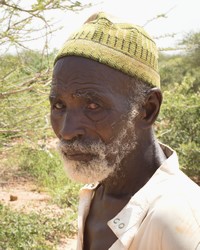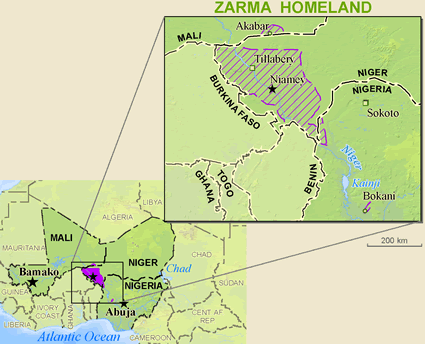The Zarma people are a West African ethnic group with no recorded history and no ancient texts. Like other ethnic groups of the region, much of their known history comes from Islamic records after the 8th century. The Zarma people are also known as Djerma, Dyerma, Zaberma, Zabarma or Zabermawa.
The Zarma people are an ethnic group predominantly found in westernmost Niger, but also found in significant numbers in the adjacent areas of Nigeria and Benin, along with smaller numbers in Burkina Faso, Ivory Coast, and Ghana. Many Zarma people have migrated into prosperous coastal cities in Ghana.
The Zarma people grow corn, millet, sorghum, rice, tobacco, cotton, and peanuts during the rainy season, June to November. They have traditionally owned herds of animals, which they rent out to others till they are ready to be sold for meat. Some own horses, a legacy of those Zarma people who historically belonged to the warrior class and were skilled cavalrymen in Islamic armies. Living along the Niger River, some Zarma people rely on fishing. The property inheritance and occupational descent is patrilineal. They are known as honest and hardworking.
It is not considered unusual for a Zarma man to take more than one wife, although this practice is more common among the older and wealthier men. For some, it is a sign of social status.
In general, the women are responsible for cooking, cleaning, hauling water, caring for the children, and numerous other chores that fill a full day. Women have little leisure time.
Housing is generally mud brick – either round with mud walls or rectangular with walls made of sun-dried mud bricks. Most houses have straw thatched roofs. If a man has more than one wife, each wife will have a separate house for her and her children.
The Zarma people have a tradition of music, group dance and singing. The common musical instruments that accompany these arts include gumbe (big drum), dondon (talking drums), molo or kuntigui (string instruments), and the goge (violin-like instrument). Some of this music accompanies spirit possession-related rituals.
The Zarma people are predominantly Sunni Muslims. They also practice traditional religion which involves wearing charms and amulets, and consulting mediums. Muslim traders took a major role in introducing Islam to the Zarma people.
Although many Bible resources are available in their language, Zarma, these people are accustomed to other sources for meeting their spiritual needs. Old customs die hard, though their spiritual needs are obvious. Much prayer and loving effort must be invested by people who know God's truth before fruit will abound.
Pray that the Zarma people will become broken hearted over their sins, and will seek their Savior, even before they know whom they are seeking.
Pray that Almighty God will break down walls and strongholds that have dominated these dear people for centuries.
Pray for a Christ-oriented Disciple Making Movement to flourish among the Zarma people in Ghana.
Scripture Prayers for the Zarma in Ghana.
http://www.zermateam.org/
https://en.wikipedia.org/wiki/Zarma_people
https://www.britannica.com/topic/Zarma
| Profile Source: Joshua Project |











